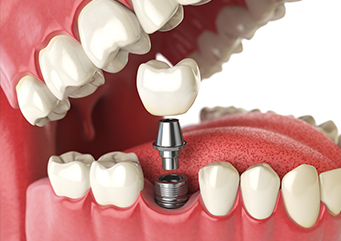
Advantages and disadvantages of Dental Implants
Dental implants are one of the best and most convenient options for replacing missing teeth. Performed in sometimes in just 1 appointment, the implant process generally yields successful results promoting a natural-looking smile, improved teeth functionality and decreasing your chances of bone loss. If you are considering dental implants as a fixed (rather than removable) solution to replacing missing teeth, here are a few pros and cons you should consider:
Advantages of Dental Implants
- Dental implants can last a lifetime if taken proper care of. Unlike dentures, they generally do not need to be replaced after a certain amount of time.
- Dental bridges rely on neighbouring teeth for support, whereas dental implants are fused into your jawbone. This protects your remaining teeth from damage or strain.
- Caring for dental implants is generally quite easy as you would practice the same oral care as you would for your normal teeth. This entails brushing, flossing and regular dental visits.
- Implants look and function like real teeth, with no clicking noises or speaking and chewing difficulties that can occur with dentures.
Disadvantages of Dental Implants
- The dental implant procedure cannot always be completed within one appointment. Waiting for the actual implant to fuse with your jawbone can take a certain amount of time. During this time, a temporary tooth will be placed over the area.
- Implants require a certain volume and density of bone. Many patients require additional bone augmentation. Fortunately bone augmentation techniques have become less invasive and less painful in recent years. Occasionally some patients are not suitable.
- Dental implants are a surgical procedure and although it is considered safe, complications cannot be ruled out. Risks include infection, nerve injuries or bleeding. Factors such as poor hygiene and smoking can increase your risks of infections.
Utmost care should be taken during the healing period, so here are a few rules to follow:
Take your medicine
In the first few days following implant surgery, it’s vital that you take the medicine prescribed by your dentist. This will help to alleviate any pain and discomfort once the anaesthetic has worn off.
Watch your diet
Following surgery it’s important that you stick to soft foods which do not require a lot of chewing. Foods such as yoghurt, soup, eggs, and mashed potatoes are ideal. You can gradually introduce harder foods as your body heals but check with your dentist or surgeon first.
Take things easy
It’s important to take things easy following oral surgery and not to try to do too much, too soon. Refrain from strenuous exercising until you are closer to being totally healed.
No smoking
Smoking or use of tobacco products affects the body’s ability to heal and will make the healing time far longer than usual. There’s also an increased risk of implant failure. To avoid complications, it’s best to give up smoking before the procedure and until healing is fully completed. In fact, wherever possible, we’d suggest you try and quit for good.
Stay in touch
During the healing period, you’ll be asked to visit your dentist for regular progress checks. It’s important that you keep all of these appointments and if you have any problems in between appointments, then please call the dentist right away to get your questions or concerns addressed. This will help prevent any complications during treatment and is important for a successful outcome.
Pacific Periodontics & Implants Gold Coast
To learn more about dental implants or to find out if you are a suitable candidate, book a consultation with us today.
Don’t forget to share this via Facebook, Twitter, Google+, Pinterest, LinkedIn, Buffer, Digg, Tumblr, Reddit, StumbleUpon and Delicious.

